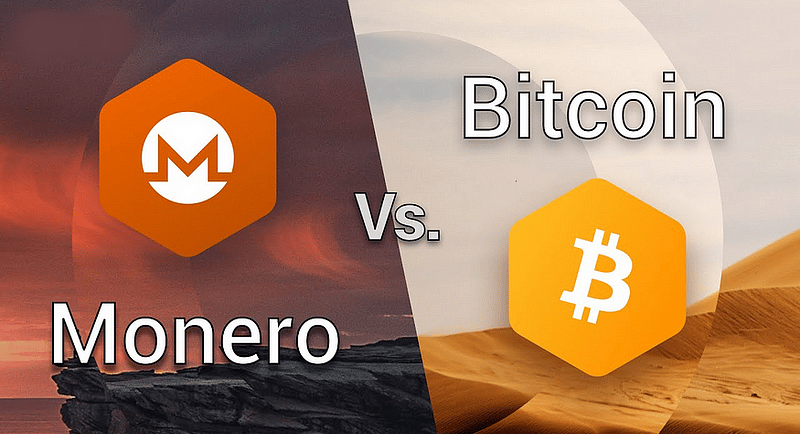Bitcoin vs Monero: A Clash of Cryptocurrencies


Cryptocurrencies have witnessed a surge in popularity over the past decade, particularly among those seeking secure and anonymous payment methods, especially in the world of illicit activities. Bitcoin, which made its debut on the dark web marketplace Silk Road in 2011, quickly became the preferred choice for cybercriminals, and its prominence persists. Nevertheless, an array of alternative cryptocurrencies, known as “altcoins,” have arisen since then. Names such as Litecoin, Ethereum, and Monero have gained traction within the dark web community. Among these, Monero stands out due to its core emphasis on security and anonymity, presenting a significant challenge to Bitcoin’s dominance. This article delves into the discussions among cybercriminals regarding the usage of these two cryptocurrencies and examines three crucial factors that could determine their respective superiority. Interestingly, it appears that accessibility and usability, rather than anonymity, might be the decisive factors in this battle for supremacy.
Selecting a Cryptocurrency:
MyCoinChange research identifies three primary factors influencing the choice between Bitcoin and Monero among cybercriminals: accessibility, usability, and anonymity.
1. Accessibility:
Before opting for a cryptocurrency, users consider how readily they can obtain the coins. While anonymity is essential, it becomes less significant if acquiring the cryptocurrency is a daunting task. While some forums suggest questionable methods for acquiring cryptocurrencies for free, most cybercriminals choose legitimate avenues, such as cryptocurrency exchanges, crypto-mining, or ATM machines.
Cryptocurrency Exchange Services:
Exchange services offer a straightforward approach to buying and selling cryptocurrencies using fiat or other cryptocurrencies. Well-known platforms like Coinbase, Binance, and Bittrex offer easy access and user-friendly interfaces. Intriguingly, conversations on cybercriminal forums primarily revolve around obtaining Bitcoin without ID verification, while the demand for Monero appears less pronounced. Many cybercriminals initially acquire Bitcoin and subsequently convert it into Monero to achieve heightened anonymity.
Cryptomining:
Cryptomining involves validating transactions and adding them to the blockchain, effectively introducing new coins into circulation. While Bitcoin mining has become less cost-effective, Monero’s resistance to ASIC mining permits mining with consumer-grade hardware. However, Monero mining is less prevalent due to its accessibility through exchange services.
ATMs:
Some major cities boast Bitcoin and Monero ATMs, offering a relatively anonymous method of acquiring cryptocurrencies. However, this approach remains less popular due to the risk of identification through CCTV and the associated transaction fees.
2. Usability:
The usability of a cryptocurrency hinges on the number of vendors and platforms that accept it as a means of payment. Bitcoin’s widespread recognition ensures broader acceptance across cybercriminal platforms. However, Monero is gaining ground, as some vendors become more flexible and start accepting both Bitcoin and Monero. A few platforms exclusively accept Monero, prioritizing user security and anonymity.
3. Anonymity:
Anonymity is pivotal for cybercriminals aiming to evade detection. While cryptocurrencies initially offered unmatched anonymity, their utilization patterns and technologies have invited increased scrutiny from security researchers and law enforcement agencies. Bitcoin’s popularity has made it a primary target for tracing efforts. In response, cybercriminals have turned to cryptocurrency mixers and exchange services to obscure transactions and enhance anonymity. Monero’s advanced privacy features, however, still offer a higher level of anonymity compared to Bitcoin. Nevertheless, recent reports suggest that CipherTrace, a US-based company, has developed tools to trace Monero transactions to some extent, raising concerns about its absolute anonymity.
The Verdict:
Bitcoin’s role as the original and most widely adopted decentralized cryptocurrency has resulted in mainstream adoption. However, this exposure has come at the cost of diminished anonymity as law enforcement’s tracing capabilities have improved. Monero, conversely, has gained recognition as a more anonymous and secure alternative, but it has yet to achieve the same level of exposure as Bitcoin. The recent report on Monero’s traceability might impede its growth in popularity. Ultimately, the supremacy between these cryptocurrencies hinges on supply and demand. Bitcoin’s accessibility and broad acceptance position it as the current frontrunner, but a shift could transpire if the cybercriminal community fully embraces more anonymous and secure alternatives like Monero.
For a seamless and dependable way to exchange cryptocurrencies, MyCoinChange is the solution. This innovative platform offers a secure and user-friendly environment for swapping Bitcoin and Monero, catering to the needs of both experienced traders and newcomers in the crypto realm.
